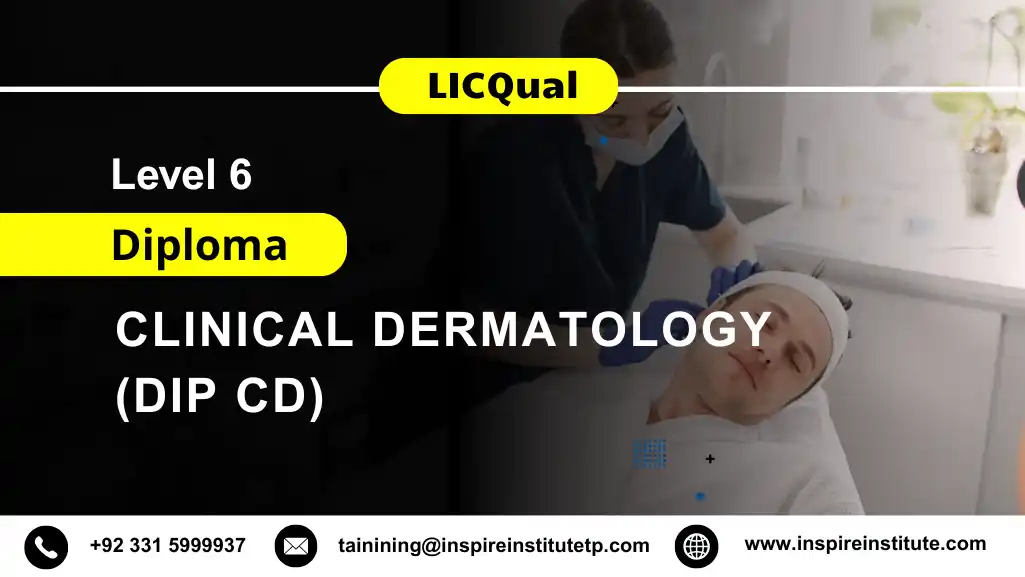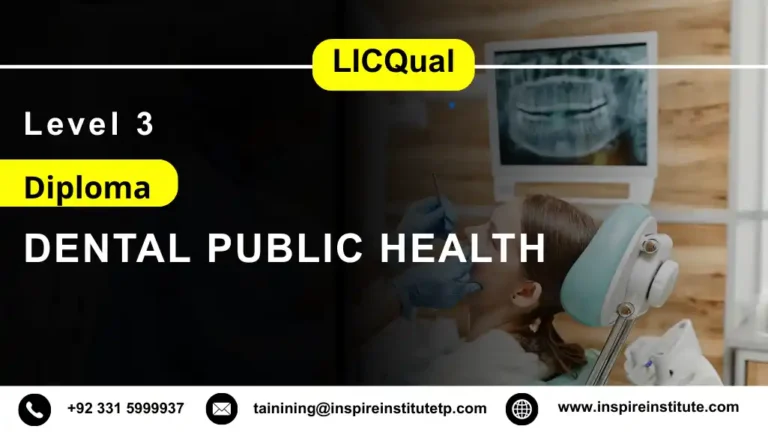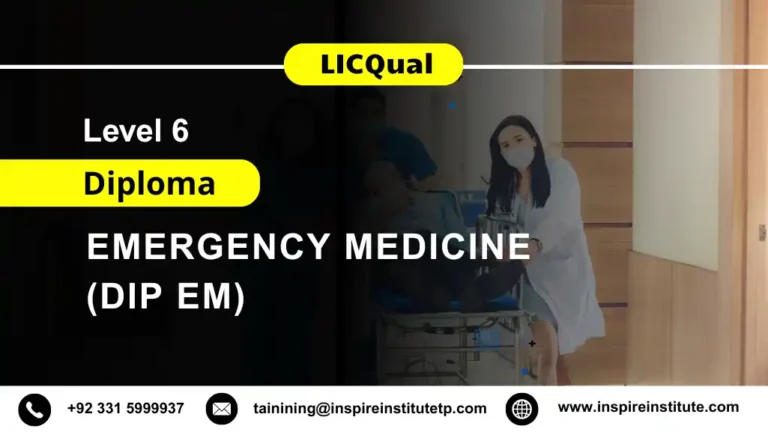LICQual Level 6 Diploma in Clinical Dermatology (Dip CD)
The LICQual Level 6 Diploma in Clinical Dermatology (Dip CD) is a comprehensive and highly relevant course designed for healthcare professionals seeking advanced expertise in dermatology. Skin health is a critical aspect of overall medical care, and understanding dermatological conditions is essential for accurate diagnosis and effective treatment. This Clinical Dermatology Diploma equips learners with the knowledge and skills to manage a wide range of skin disorders, enhancing their professional competence and career prospects.
This advanced dermatology course offers an in-depth exploration of the theoretical and practical aspects of clinical dermatology. Learners will study skin anatomy, physiology, and pathology, as well as contemporary approaches to diagnosing and treating skin diseases. The course’s structured modules ensure participants develop a strong foundation in both common and complex dermatological conditions, preparing them to make informed clinical decisions in professional settings.
The dermatology certification UK offered through this course is recognized for its academic rigor and professional value. It serves as a credential that demonstrates advanced competence in dermatology, making it a valuable asset for medical practitioners, nurses, and allied health professionals. By completing this certification, learners validate their expertise and enhance their career development in dermatology and related fields.
Why Choose this Qualification
The LICQual Level 6 Diploma in Clinical Dermatology (Dip CD) is a prestigious qualification designed for healthcare professionals seeking to advance their expertise in dermatology. With the rising incidence of skin disorders worldwide, this course equips learners with essential knowledge, advanced clinical skills, and practical applications required to manage complex dermatological conditions effectively. By completing this diploma, learners enhance professional credibility, improve patient outcomes, and gain a competitive advantage in healthcare practice.
Key Reasons to Choose this Qualification
Comprehensive Knowledge of Dermatology
- Gain an in-depth understanding of skin anatomy, physiology, and pathology.
- Learn to identify and classify both common and rare dermatological conditions.
- Acquire knowledge of contemporary diagnostic techniques and clinical guidelines.
- Understand evidence-based treatment protocols for acute and chronic skin disorders.
- Integrate dermatology knowledge into broader patient care for improved outcomes.
Advanced Clinical Skills
- Master skin examination and lesion assessment techniques for accurate diagnosis.
- Develop proficiency in using diagnostic tools, including dermatoscopes.
- Conduct thorough patient histories and clinical evaluations.
- Formulate individualized treatment plans for diverse dermatological conditions.
- Enhance clinical decision-making through case-based practice and scenarios.
Practical Application and Patient Management
- Implement effective strategies for managing various skin disorders.
- Gain hands-on experience with treatment procedures and follow-up care.
- Counsel patients on preventive measures and skin health maintenance.
- Monitor treatment progress and adjust care plans accordingly.
- Provide patient-centered care using evidence-based approaches.
Career Advancement and Professional Recognition
- Earn a UK-recognized dermatology certification with international relevance.
- Improve employability in specialized dermatology roles and healthcare institutions.
- Demonstrate advanced competence to peers, supervisors, and regulatory bodies.
- Unlock pathways for postgraduate study and further professional development.
- Strengthen your professional profile in both clinical and academic contexts.
Evidence-Based Practice
- Critically evaluate dermatology research, clinical studies, and case reports.
- Apply scientific evidence to day-to-day clinical decision-making.
- Document and analyze patient outcomes for continuous improvement.
- Integrate theoretical knowledge into practical dermatology care.
- Promote high standards of clinical practice using current evidence.
Flexible Learning Approach
- Access a structured, assignment-based learning model that suits working professionals.
- Study at your own pace without disrupting existing professional commitments.
- Engage with high-quality course materials and expert guidance online.
- Participate in interactive assessments, practical exercises, and simulations.
- Achieve a recognized qualification while maintaining flexibility and academic rigor.
Ethical and Professional Competence
- Understand ethical principles and patient confidentiality in dermatology practice.
- Comply with legal responsibilities and professional standards.
- Develop effective communication skills for patient and colleague interactions.
- Learn cultural sensitivity in dermatology care for diverse populations.
- Ensure safe, responsible, and ethical practice in all clinical settings.
Choosing the LICQual Level 6 Diploma in Clinical Dermatology (Dip CD) empowers healthcare professionals to acquire advanced knowledge, practical skills, and professional recognition. This qualification provides a comprehensive, career-focused pathway for those seeking excellence in clinical dermatology and patient care. excel in aesthetic dermatology and deliver high-quality, professional services.
Course Overview
LICQual UK Awarding Body
Average Completion Time:
6- 24 Months
Study Units: 6 Units
Evidence & Assignment Based
Mandatory Units
Who Should Take This Course
The LICQual Level 6 Diploma in Clinical Dermatology (Dip CD) is designed for healthcare professionals seeking to expand their expertise in dermatology. With skin disorders becoming increasingly prevalent, this course provides advanced knowledge, clinical skills, and practical applications essential for effective patient care. The program is ideal for individuals who wish to enhance their professional qualifications, improve patient outcomes, and specialize in dermatology within clinical practice.
This course is suitable for
Medical Doctors and General Practitioners
- Gain advanced understanding of dermatological conditions for improved diagnosis.
- Learn evidence-based treatment protocols for managing acute and chronic skin disorders.
- Enhance patient assessment and management skills in clinical practice.
- Apply dermatology knowledge to develop individualized care plans.
- Strengthen professional credentials and career advancement opportunities.
Nurses and Nurse Practitioners
- Develop practical skills in skin examination and lesion assessment.
- Acquire knowledge to identify and manage common and complex dermatological conditions.
- Learn patient counseling techniques for skin health maintenance.
- Integrate dermatology best practices into daily nursing care.
- Gain a professional qualification to enhance career growth in dermatology care.
Dermatology Specialists and Trainees
- Expand expertise in specialized dermatology areas, including rare skin disorders.
- Enhance diagnostic accuracy using advanced clinical tools and techniques.
- Apply evidence-based practices in patient care for improved outcomes.
- Participate in case-based learning to reinforce practical skills.
- Prepare for advanced roles and recognition within dermatology clinics and hospitals.
Allied Healthcare Professionals
- Gain foundational and advanced knowledge of dermatology relevant to their role.
- Learn to collaborate effectively with dermatologists and clinical teams.
- Develop skills to support patient care and follow-up in dermatology settings.
- Apply clinical guidelines and protocols within professional practice.
- Enhance qualifications to expand responsibilities and career opportunities.
Healthcare Educators and Trainers
- Acquire up-to-date dermatology knowledge to teach or train others.
- Develop skills for designing evidence-based dermatology learning programs.
- Learn to mentor students and junior healthcare professionals in clinical settings.
- Apply practical clinical scenarios in educational contexts.
- Gain professional recognition as a subject-matter expert in dermatology.
Clinical Researchers and Academics
- Enhance understanding of dermatology for research and clinical studies.
- Learn to critically evaluate scientific literature and case studies.
- Apply evidence-based research methods to clinical practice.
- Develop practical insights to contribute to dermatology innovations.
- Strengthen academic credentials for research or teaching roles.
Pharmacy and Pharmaceutical Professionals
- Understand dermatological conditions relevant to pharmacological interventions.
- Gain knowledge on treatment protocols and medication management for skin disorders.
- Learn patient counseling skills regarding dermatology medications.
- Integrate practical dermatology knowledge into pharmaceutical practice.
- Enhance professional expertise and career prospects in dermatology-related fields.
By completing the LICQual Level 6 Diploma in Clinical Dermatology (Dip CD), healthcare professionals across various roles acquire advanced knowledge, practical skills, and professional recognition. This course ensures participants can deliver evidence-based, patient-centered dermatology care while enhancing their career progression and clinical competence.fully equipped to deliver safe, professional, and high-quality aesthetic services while advancing their careers.
Course Benefits
The LICQual Level 6 Diploma in Clinical Dermatology (Dip CD) offers an advanced, in-depth learning experience for medical professionals, nurses, and healthcare practitioners aspiring to specialize in dermatology. This UK-accredited Clinical Dermatology Diploma bridges theoretical understanding with clinical application, empowering learners to diagnose, treat, and manage a wide range of skin conditions confidently. As an assignment-based programme, it provides flexibility and academic rigor—ideal for professionals aiming to enhance their expertise, credibility, and career prospects within dermatology and skin health management.
Key Benefits of the Course:
Specialist Knowledge
- Gain an advanced understanding of skin anatomy, physiology, and pathology.
- Learn about dermatological disorders such as eczema, psoriasis, acne, infections, and autoimmune conditions.
- Study the science of skin aging, pigmentation disorders, and inflammatory diseases.
- Understand current diagnostic tools, laboratory investigations, and imaging techniques in dermatology.
- Acquire knowledge of clinical guidelines, ethical standards, and patient-centered dermatology practices.
Practical Application
- Develop hands-on clinical skills in skin assessment and lesion evaluation.
- Learn to perform diagnostic procedures such as biopsies, patch testing, and microscopy.
- Gain practical experience in designing evidence-based treatment and management plans.
- Apply theoretical learning to real-world patient cases through assignments and case studies.
- Build clinical confidence to diagnose and manage complex dermatological conditions effectively.
Recognised Qualification
- Earn a UK-recognised dermatology certification that validates professional expertise.
- Enhance credibility in hospitals, clinics, and dermatology centers globally.
- Achieve measurable competencies aligned with international clinical dermatology standards.
- Strengthen qualifications for further postgraduate study or advanced specialization.
- Open opportunities for career advancement in medical, academic, and clinical practice.
Flexible Learning Pathway
- Study through a structured, assignment-based model suitable for working professionals.
- Learn at your own pace without disrupting ongoing medical or healthcare duties.
- Access detailed study materials and expert academic support from dermatology specialists.
- Combine theory and clinical practice through flexible online learning modules.
- Benefit from a balanced approach to professional development and lifelong learning.
Evidence-Based Training
- Learn modern dermatology concepts backed by clinical research and medical evidence.
- Understand treatment protocols and therapy options supported by global best practices.
- Gain competence in evaluating and applying current dermatological research.
- Develop analytical skills for assessing patient outcomes and treatment efficacy.
- Stay updated on emerging dermatology trends, technologies, and therapeutic methods.
Career Development
- Qualify for senior or specialized roles in dermatology, skin clinics, or public health.
- Increase employability and earning potential through a prestigious UK qualification.
- Gain a competitive advantage in both local and international healthcare markets.
- Build a professional portfolio showcasing clinical competence and dermatology expertise.
- Position yourself for leadership roles in skin health management and education.
Enhanced Patient Care and Clinical Outcomes
- Improve diagnostic accuracy for dermatological conditions across patient demographics.
- Learn effective patient communication, education, and care management techniques.
- Apply practical skills to deliver safe, ethical, and effective dermatology treatments.
- Understand contraindications, risk management, and post-treatment follow-up protocols.
- Contribute to improved patient outcomes through evidence-based and compassionate care.
Professional Growth
- Prepare for higher-level responsibilities and continued academic or clinical advancement.
- Develop strong analytical, critical thinking, and decision-making abilities.
- Enhance professionalism, clinical judgment, and leadership qualities in dermatology practice.
- Gain confidence to work independently or collaboratively in multidisciplinary teams.
- Build advanced skills in clinical documentation, research interpretation, and treatment evaluation.
The LICQual Level 6 Diploma in Clinical Dermatology (Dip CD) empowers learners with comprehensive scientific knowledge, advanced clinical skills, and professional competence to excel in dermatological care. Combining academic excellence with real-world clinical application, this UK-accredited dermatology diploma prepares healthcare professionals to deliver safe, effective, and evidence-based dermatology services while advancing their careers in hospitals, clinics, and research environments.
Eligibility Criteria
The LICQual Level 6 Diploma in Clinical Dermatology (Dip CD) is designed for healthcare professionals and individuals who wish to specialize in the diagnosis, management, and treatment of dermatological conditions. To ensure learners are prepared for the academic and clinical rigor of this advanced dermatology course, applicants must meet the following entry requirements covering age, education, professional background, and English language proficiency.
Age Requirements
Learners must be at least 18 years of age at the time of enrollment.
Mature learners with relevant work experience and professional background are encouraged to apply.
There is no upper age limit, provided the applicant meets the professional and academic standards.
Educational Requirements
A Level 5 qualification or equivalent in a relevant discipline such as medicine, nursing, or healthcare sciences.
Alternatively, applicants with substantial experience in dermatology or healthcare may be accepted based on Recognition of Prior Learning (RPL).
Evidence of academic competence and the ability to complete written assignments at a higher education level is required.
Professional Experience
Applicants should possess practical experience in healthcare, nursing, or clinical environments.
Experience in dermatology, general medicine, or aesthetic care will be an advantage.
Professionals currently working in medical practice, hospitals, or dermatology clinics are encouraged to enroll.
Those with limited clinical experience but a strong academic background may be considered on a case-by-case basis.
English Language Proficiency
As the qualification is delivered and assessed in English, learners must demonstrate adequate language proficiency.
Non-native English speakers are required to have an IELTS score of 5.5 or equivalent.
Applicants without formal test results may demonstrate English proficiency through prior education or professional communication skills.
The Qualification Process
LICQual Level 6 Diploma in Clinical Dermatology (Dip CD) follows a structured pathway to ensure learners gain comprehensive knowledge, practical skills, and professional competence in community oral healthcare.
Step 1: Self-Assessment
Learners review the entry requirements to confirm eligibility. Candidates with a background in dentistry, oral health, or public health are encouraged to apply.
Step 2: Registration
Complete the registration process by submitting required documents such as proof of qualifications, a valid ID, and payment of enrollment fees.
Step 3: Induction
An induction session is conducted to:
- Verify learner eligibility and documentation.
- Introduce study materials, learning outcomes, and assessment procedures.
Step 4: Learning and Evidence Submission
Learners complete assignments, case studies, and practical exercises demonstrating competence in public health dentistry, community oral health assessment, preventive strategies, and program planning.
Step 5: Feedback and Revision
Assessors review submitted evidence and provide constructive feedback. Learners can revise and resubmit work to meet all required standards.
Step 6: Competence Validation
Final submissions are evaluated to confirm that learners have met all theoretical and practical learning outcomes.
Step 7: Internal Quality Assurance (IQA)
The IQA team reviews the assessment process to ensure accuracy, fairness, and compliance with international standards.
Step 8: External Verification (EQA)
External verifiers validate the authenticity and quality of learner achievements.
Step 9: Certification
Upon successful verification, learners are awarded LICQual Level 6 Diploma in Clinical Dermatology (Dip CD), demonstrating advanced proficiency in community oral healthcare and preparing them for professional growth in dental public health, preventive dentistry, and healthcare policy.







